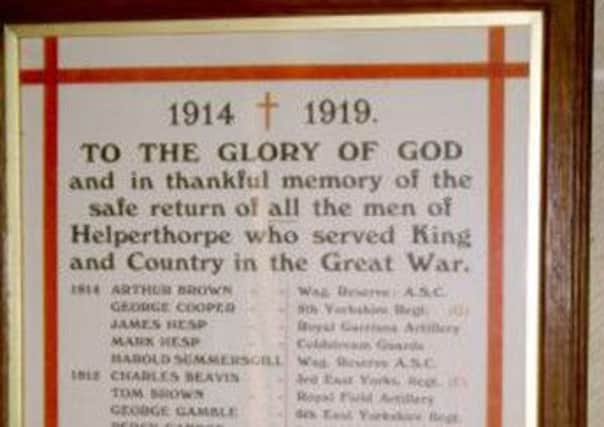The few Thankful places where every soldier came home


HELPERTHORPE is like many other pretty, tranquil villages up and down the country.
Nudged either side by the lush, gently rolling hills of the Yorkshire wolds, it has a long village green, while St Peter’s Church has been at the heart of the community since 1875 (the old wooden structure was pulled down three years earlier).
Advertisement
Hide AdAdvertisement
Hide AdBut there is something missing here. Most villages have a respectful stone memorial to those who gave their lives during the Great War, but here there’s no such memorial – because everyone returned home.
Helperthorpe, 10 miles east of Malton, is one of 52 “Thankful villages” in England and Wales that didn’t lose a single soul to the fighting during the war. It is one of just five villages in Yorkshire that survived the conflict unscathed, the others being Cundall, Norton-le-Clay, Scruton and Catwick – the latter is one of those even rarer places that lost nobody in either world wars.
The term “thankful village” was coined in the 1930s by the writer Arthur Mee to describe the handful of communities that didn’t suffer any military fatalities during the war. So instead of memorials in memory of the dead many have plaques giving thanks for their salvation.
The scale of their good fortune is quite extraordinary. An estimated million British and Commonwealth lives were lost during the First World War. No Scottish community appears to have been left unscathed, and no thankful villages have been identified in Ireland, either, which was still part of the UK during this period.
Advertisement
Hide AdAdvertisement
Hide AdHowever, the 52 ‘Thankful villages’ in England and Wales are dwarfed by the 16,000 villages which weren’t so fortunate and paid the highest sacrifice. They represent a striking anomaly in Britain’s complex war story, a strand picked up by Simon Armitage. The Marsden-born poet has written seven new poems inspired by different stories from the war that feature in a special Culture Show programme being shown on BBC 2 next weekend.
Helperthorpe was among the many places that he visited. “By definition these ‘Thankful villages’ can only be small places because if they were bigger people would inevitably have died. So instead of a war memorial there’s a very discreet, almost apologetic roll of honour inside the church giving thanks to these people who went out and all came back,” he says.
“The men who went out from Helperthorpe were part of the Wagoners and I have this image in my mind that one minute they were hauling these carts through the idyllic wolds, and the next minute they had the same horses and same carts pulling munitions and bodies through the trenches.”
Many war stories didn’t have a happy ending and Armitage believes it is important that we remember what people went through. “A century ago this year, the First World War began. The Great War – but great only in its scale of catastrophe. Well over 700,000 British soldiers died in the bloodbath that followed. I don’t have a head for numbers – that statistic is incomprehensible. It’s about human beings – people who lived and breathed just as we do and at the very least our memory of them should be kept alive.
Advertisement
Hide AdAdvertisement
Hide Ad“Siegfried Sassoon, Wilfred Owen, Ivor Gurney, Robert Graves – I never fail to be affected and moved by their poems, especially those that reflect directly on the horror and brutality and drag the reader with them through the barbed wire and mud.
“But a hundred years have passed now and as a poet I feel bound by duty or tradition to take the opportunity to reflect again on the catastrophic loss of life and to think about how we commemorate the dead for the next 100 years.”
The Great War: an Elegy, is on BBC Two, November 8, at 8pm.